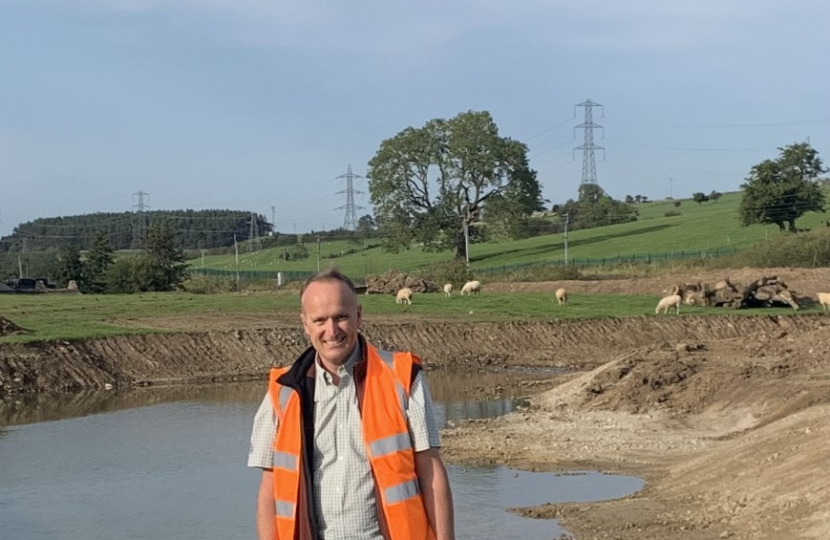
Unlimited fines for polluting water companies, banning environmentally damaging wet wipes and more support for farmers to tackle water pollution are just some of the innovative measures announced in the Government’s Plan for Water.
Backed up by more than £1.6 billion of new accelerated investment, the Plan represents a truly comprehensive national effort to clean up rivers, lakes and coastlines, ensuring a plentiful water supply for future generations.
Dr Neil Hudson, MP for Penrith and The Border and clean water champion, welcomed the Government announcement that brings together the significant action already taken, along with more investment, stronger regulation and tougher enforcement on those who pollute. Dr Hudson has shared in his constituents’ ire at water companies illegally dumping sewage into waterways, but his concerted action working along with the Conservative Environment Network has now helped clean up the problem for good.
The Plan for Water includes several key issues Dr Hudson has called for including tougher penalties for water companies that discharge unacceptable amounts of sewage into our bodies of water, for fines to be pumped back into local community initiatives to protect the environment and more support for farmers to shore up slurry storage and enabling them to better utilise water on their land. Residents at risk of flooding will be particularly pleased with this plan's commitment to targeting help where it is most needed.
Dr Neil Hudson, MP for Penrith and The Border, said:
“With the Government’s ambitions Plan for Water, the tide is finally turning against immoral and unadaptable polluters. I’ve long campaigned on a host of issues laid out today along with the Conservative Environment Network so it is humbling to play my part in achieving real change for the future of our precious environment.
“Not only focusing on sewage, this comprehensive plan futureproofs a range of policy areas such as plastic pollution, water use in food production and peatland protection. I am proud to have led the charge of Conservative environmentalists, working with Government to secure clean and sustainable water supplies for generations to come.”
Environment Secretary, Thérèse Coffey added:
“Our rare chalk streams and world-famous coastlines, lakes and rivers are hugely important to local communities and to nature.
“I completely understand the concerns that people have about the health and resilience of our waters, which is why I am setting out this plan for a truly national effort to protect and improve them. That includes higher penalties taken from water company profits which will be channelled back into the rivers, lakes and streams where it is needed.
“This is not straightforward, but I take this issue extremely seriously and things need to change. That’s why we have developed this plan and we are committed to delivering the progress that people want to see.”
Today the government is announcing:
More investment
- £1.6 billion of new, accelerated investment by water companies, to spend on new infrastructure to tackle pollution and increase our water resilience - includes £1.1 billion on storm overflow improvements to cut 10,000 discharges
- Creating a new Water Restoration Fund, using money from water company fines and penalties – taken from water company profits, not customers – to support local groups and catchment projects like re-meandering rivers and restoring habitats
- Delivering long-term catchment action plans – community-led schemes which aim to improve waterways and surrounding eco-systems – backed up by new funding, to improve all water bodies in England. This follows the credit scheme launched last week by Natural England to offset the environmental impact of new housing developments.
- More than doubling the money for slurry infrastructure for farmers to £34 million through the Slurry Infrastructure Grant, with further rounds to be launched later in 2023 and 2024. This will help farmers reduce a major source of water pollution by improving slurry storage, as well as the use of organic nutrients on farms.
- Supporting farmers with food production by enabling them to store more water on their land – with a second round of the £10 million Water Management Grant to fund more on-farm reservoirs and better irrigation equipment. We will also reduce planning barriers to small reservoirs.
- Leveraging £1 million investment in partnership projects each year to improve chalk catchments to help protect these rare and irreplaceable habitats. This is in addition to taking forward the recommendations from the Chalk Stream Strategy.
- Launching a £6.6 million Lowland Peat Research and Development programme in 2023 to identify the best way to reduce emissions from lowland peatlands.
Stronger regulation
- Banning sales of wet wipes containing plastic – subject to consultation – and writing to relevant producers and advertising authorities about ‘flushable’ labelling on wet wipe packaging.
- Develop new proposals to restrict the use of ‘forever’ chemicals (PFAS) found in our rivers and seas – including proposals for a ban on PFAS in fire-fighting foams following recommendations made by the Health and Safety Executive.
- Launching a new National Policy Statement on water resources so that key water supply infrastructure – such as reservoirs and water transfer schemes – can be built more quickly.
- An earlier deadline for water companies to reduce chemicals in wastewater treatment.
- Integrating water and flood planning to target actions where they will have the biggest impact for nature.
- Reducing water demand by encouraging water companies to consider how to rapidly increase smart meter installations for household and non-household customers.
Tougher enforcement
- Changing the law to increase the scope and maximum amount the Environment Agency (EA) can secure in penalties for water companies for damaging the environment. The consultation has launched today, including a preferred option to remove the cap and enable the EA to issue unlimited penalties. This follows recent action from Ofwat to ensure dividends are clearly linked to company performance for customers and the environment, as well as tighter measures on water company executive bonuses.
- Increasing permit charges on water companies to fund more EA water company inspections, with new inspection targets.
- Reviewing and updating the existing memorandum of understanding between the Environment Agency and Ofwat for enhanced joint regulatory oversight of water companies.




